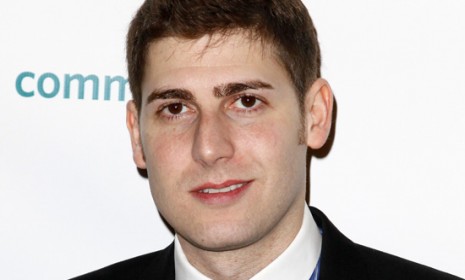Why are conservatives defending a billionaire who abandoned America?
Facebook co-founder Eduardo Saverin, widely derided for renouncing his U.S. citizenship before the company's lucrative IPO, is finding powerful allies on the Right

Eduardo Saverin, a Facebook co-founder, renounced his U.S. citizenship just before the company's $16 billion IPO, in what is widely seen as an attempt to avoid paying taxes. The Brazilian-born Saverin, who became an American citizen in 1992, is being lambasted for ingratitude, with many saying he could not have made his billions without the opportunities afforded him in America. Democratic senators have introduced legislation, dubbed the Ex-Patriot Act, that would force similar tax dodgers to pay a 30 percent tax rate on their U.S. assets and bar them from re-entering the country. Some Republicans, like House Speaker John Boehner (R-Ohio), have also denounced Saverin, but notable conservatives, including anti-tax advocate Grover Norquist and The Wall Street Journal editorial board, are slamming Democrats for behaving like Nazis and Communists. What should we make of this controversy?
For conservatives, the enemy is the U.S. tax code: Saverin's decision to become a citizen of low-tax Singapore reeks of opportunism, says Jay Bookman at The Atlanta Journal-Constitution. But anti-tax ideologues in the conservative movement are claiming that "the United States is simply getting what it deserves for not cutting taxes on the wealthy even lower than they are today." Conservatives don't seem to realize that the U.S. "cannot be a country in which it is possible to create a behemoth such as Facebook and also be a country in which regulation and overtaxation have made it impossible to succeed. Both things cannot be true."
"Facebook, patriotism, taxes, and fair play"
The Week
Escape your echo chamber. Get the facts behind the news, plus analysis from multiple perspectives.

Sign up for The Week's Free Newsletters
From our morning news briefing to a weekly Good News Newsletter, get the best of The Week delivered directly to your inbox.
From our morning news briefing to a weekly Good News Newsletter, get the best of The Week delivered directly to your inbox.
This is a political loser for Republicans: "Tax fairness is a central theme for Democrats" this election season, and the Ex-Patriot Act is "an easy opportunity for Democrats to return to that broad theme," says Sahil Kapur at Talking Points Memo. Conservative denunciation of the Democrats' legislation "is putting Republican leaders in a politically precarious situation," and could force them to "oppose punishing wealthy Americans who renounce their citizenship to duck their legal obligations."
"Conservatives liken Dems' bill banning citizenship tax-dodging to Nazis, Soviets"
But the Democratic bill is legally dubious: The Ex-Patriot Act's Democratic sponsors, Chuck Schumer (N.Y.) and Bob Casey (Penn.), "are showing themselves to be irresponsible legislators by introducing a bill that they explicitly conceived in order to punish" Saverin, says Conor Friedersdorf at The Atlantic. Saverin may deserve our scorn, but "it is imprudent to impulsively introduce legislation in order to target a specific high-profile individual who happens to be making news," especially for actions that were perfectly legal beforehand. The senators are effectively conducting a trial by legislature, and "it's an affront to the rule of law."
"Why the Ex-Patriot Act is a creepy law"
A free daily email with the biggest news stories of the day – and the best features from TheWeek.com
-
 High Court action over Cape Verde tourist deaths
High Court action over Cape Verde tourist deathsThe Explainer Holidaymakers sue TUI after gastric illness outbreaks linked to six British deaths
-
 The battle over the Irish language in Northern Ireland
The battle over the Irish language in Northern IrelandUnder the Radar Popularity is soaring across Northern Ireland, but dual-language sign policies agitate division as unionists accuse nationalists of cultural erosion
-
 Villa Treville Positano: a glamorous sanctuary on the Amalfi Coast
Villa Treville Positano: a glamorous sanctuary on the Amalfi CoastThe Week Recommends Franco Zeffirelli’s former private estate is now one of Italy’s most exclusive hotels
-
 The billionaires’ wealth tax: a catastrophe for California?
The billionaires’ wealth tax: a catastrophe for California?Talking Point Peter Thiel and Larry Page preparing to change state residency
-
 Bari Weiss’ ‘60 Minutes’ scandal is about more than one report
Bari Weiss’ ‘60 Minutes’ scandal is about more than one reportIN THE SPOTLIGHT By blocking an approved segment on a controversial prison holding US deportees in El Salvador, the editor-in-chief of CBS News has become the main story
-
 Has Zohran Mamdani shown the Democrats how to win again?
Has Zohran Mamdani shown the Democrats how to win again?Today’s Big Question New York City mayoral election touted as victory for left-wing populists but moderate centrist wins elsewhere present more complex path for Democratic Party
-
 Millions turn out for anti-Trump ‘No Kings’ rallies
Millions turn out for anti-Trump ‘No Kings’ ralliesSpeed Read An estimated 7 million people participated, 2 million more than at the first ‘No Kings’ protest in June
-
 Ghislaine Maxwell: angling for a Trump pardon
Ghislaine Maxwell: angling for a Trump pardonTalking Point Convicted sex trafficker's testimony could shed new light on president's links to Jeffrey Epstein
-
 The last words and final moments of 40 presidents
The last words and final moments of 40 presidentsThe Explainer Some are eloquent quotes worthy of the holders of the highest office in the nation, and others... aren't
-
 The JFK files: the truth at last?
The JFK files: the truth at last?In The Spotlight More than 64,000 previously classified documents relating the 1963 assassination of John F. Kennedy have been released by the Trump administration
-
 'Seriously, not literally': how should the world take Donald Trump?
'Seriously, not literally': how should the world take Donald Trump?Today's big question White House rhetoric and reality look likely to become increasingly blurred